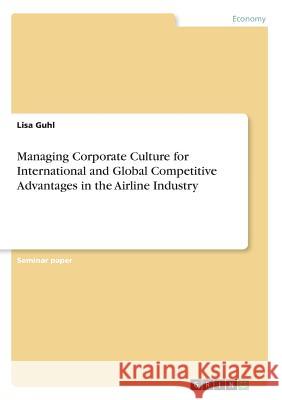Managing Corporate Culture for International and Global Competitive Advantages in the Airline Industry » książka
Managing Corporate Culture for International and Global Competitive Advantages in the Airline Industry
ISBN-13: 9783668349490 / Angielski / Miękka / 2016 / 32 str.
Managing Corporate Culture for International and Global Competitive Advantages in the Airline Industry
ISBN-13: 9783668349490 / Angielski / Miękka / 2016 / 32 str.
(netto: 150,97 VAT: 5%)
Najniższa cena z 30 dni: 157,21
ok. 16-18 dni roboczych.
Darmowa dostawa!
Seminar paper from the year 2015 in the subject Business economics - Business Management, Corporate Governance, grade: 1,7, University of applied sciences, Dusseldorf, language: English, abstract: Ever since globalization has started companies have been looking for ways to compete successfully on a global scale. Trends in the global environment such as rapid communication, technology innovation, and global sourcing models requiring to manage cultural differences are still challenging for many industries (cp. Yip, 2003, pp. 1-3). The airline industry being itself a reason for an increasing borderless world also faces these global trends and high competition due to expansion, consolidation, concentration, and alliances. Terrorism and rising costs for fuel, labour, maintenance, and security have not been the only threats for the industry. Also rising customer expectations e.g. regarding comfort, entertainment, experience, convenience, innovation, personalization and value for money require the airline industry to change dynamically. Moreover, airlines face demands for pollution control, corporate social responsibility, and sustainable travel. Rising competition from low-cost carriers is also relevant since their share of global capacity increased to more than 25 % in 2013. So, even if demand for air transportation has grown by an average of 9 % per year since 1960, and global airline revenues reached a new high of US$708 billion in 2013, airlines need to find ways to stand international and global competition as their environment potentially endangers profits and economic survival (cp. Lynes & Dredge, 2006, pp. 122-129; PricewaterhouseCoopers, 2014, pp. 2-3).











